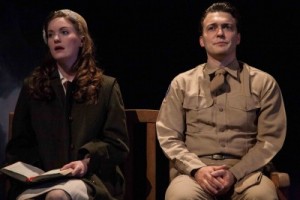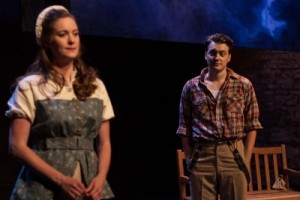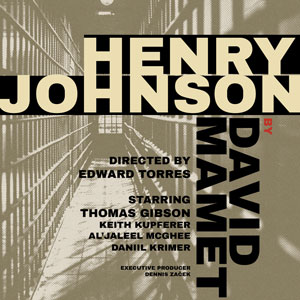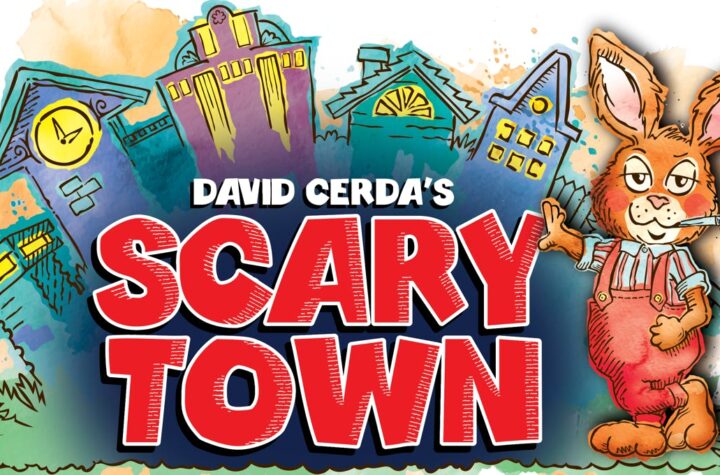
 [rating=5] Set during World War II, Arlene Hutton’s play Last Train to Nibroc begins on a train carrying the bodies of the great American writers Nathaniel West and F. Scott Fitzgerald: prophets of the doomed American dream of success, money, fame, and high living. It is also carrying two people dealing with more specific and every-day disappointments. Raleigh (Mike Tepeli), a pilot recently discharged from the Air Force for medical reasons, and May (Amanda Drinkall), whose fiancée has been so changed by combat that she can no longer marry him. He knows her fiancée, but not her, and when he takes the seat beside her, their initial exchanges are rather testy. They soon discover, however, that they were both bred in the same county, and swap stories of festivals and tent revivals. In turns out that, Raleigh, inspired by the novels of West and Fitzgerald, is headed to New York City to try his hand at becoming a writer while May, inspired by a traveling preacher and the writing of Lloyd C. Douglas, is returning home to pursue a life as a missionary.
[rating=5] Set during World War II, Arlene Hutton’s play Last Train to Nibroc begins on a train carrying the bodies of the great American writers Nathaniel West and F. Scott Fitzgerald: prophets of the doomed American dream of success, money, fame, and high living. It is also carrying two people dealing with more specific and every-day disappointments. Raleigh (Mike Tepeli), a pilot recently discharged from the Air Force for medical reasons, and May (Amanda Drinkall), whose fiancée has been so changed by combat that she can no longer marry him. He knows her fiancée, but not her, and when he takes the seat beside her, their initial exchanges are rather testy. They soon discover, however, that they were both bred in the same county, and swap stories of festivals and tent revivals. In turns out that, Raleigh, inspired by the novels of West and Fitzgerald, is headed to New York City to try his hand at becoming a writer while May, inspired by a traveling preacher and the writing of Lloyd C. Douglas, is returning home to pursue a life as a missionary.
Over the course of the next three scenes, it transpires that this play is not about the quest for success and fame found in West, the emptiness and doom of high living that Fitzgerald represented as the failed American dream, or the heroic religious quests or spiritual conversions of Lloyd C. Douglas’s novels. Instead it is a rustic, romantic, tragi-comedy that unfolds before us as Raleigh and May begin a long courtship over three scenes, each set in rural Tennessee, in between which their relationship is beset by slights, a long estrangement, May’s brother dying war in war, and an attack of epilepsy that leaves Raleigh confined to a mental institution. The misunderstandings that must be resolved by the play’s conclusion are interpersonal, not geopolitical, religious, or socially based: some of them are even peculiar to the culture of the rural south during the 1940’s. The final charming scene ends in the discovery of a shared commitment to each other (partly through a comical misunderstanding), the promise of marriage, and a life together.
Tepeli and Drinkall, through convincing dialogue; acting; and story-telling, bring scenes; events; and characters that never appear on stage to life. The mental hospital, the Nibroc festival, the Tent Revival meetings, the minister, the church school where May teaches, May and Raleigh’s families, and the vast chasm between Combat and The War in Europe and a tent where they both end up tasting pickles are all represented in the actor’s dialectal and story-telling prowess so that we all but forget that this is a two person play. Throughout this, both actors are able to sustain dynamic, entertaining, and believably likable characters.
They are assisted by a highly talented technical crew. Brittany Dee Bodley has designed period costumes that maintain both glamour and credibility as rural dress, and though the set (Joanna Iwanicka), lighting (Sarah Hughey), and sound (Joe Court) can be somewhat abstract and at times minimalist, they create an extremely powerful ambience in which the actor’s can bring Hutton’s script to life. Property Designer (Jamie Karas) even found what appeared to be 1940’s editions of Lloyd C. Douglas’s novels. Director Jason Gerace is to be congratulated on a superlative production of this strange and surprising play in which charm, comedy, and happiness dominate a script permeated by grief, injustice, war, misunderstanding, and disappointments.
Haven Theatre Company’s production of “Last Train to Nibroc” plays through Sunday September 6th at Theatre Wit located at 1229 W. Belmont Avenue Chicago. Performances are Thursday through Saturdays at 8 PM and Sunday’s at 3 PM. The Plays runs for an hour and thirty minutes with no intermission. Regular Tickets are $28 dollars. Student, Industry, and Senior Tickets are $15. They can be purchased at the box office, by visiting www.theatrewit.com or by calling 773-975-8150. There is street parking in the area, some metered, others not , but if you are dining at Cooper’s, you can park there as well.
To see what others are saying, visit www.theatreinchicago.com, go to Review Round-up and click at “Last Train to Nibroc”







More Stories
“Henry Johnson”
“Scary Town” reviewed by Frank Meccia
“Translations”